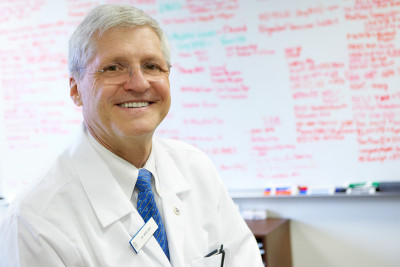
Screening tumor samples for cancer-causing genetic mutations can help physicians tailor treatment to specifically target those mutations in patients with advanced lung cancer.
A new study detected one of ten such mutations in 54 percent of the 516 lung cancer patients tested at diagnosis. The results enabled doctors to select the most appropriate drug designed to block the identified mutation and choose other treatment options for those patients whose tumors did not have a mutation.
The results of the multicenter study are being presented today by the study’s lead author, Mark Kris, MD, Chief of the Thoracic Oncology Service at Memorial-Sloan Kettering, at the 2011 annual meeting of the American Society of Clinical Oncology.
“The key to treating men and women with lung cancer lies in understanding the genetic makeup of each person’s tumor,” said Dr. Kris. “Pinpointing specific mutations known to play a role in one-third of lung cancers can help maximize the chance of treatment success with personalized medicine.”
Memorial Sloan Kettering is one of 14 institutions participating in this ongoing study, which has collaboratively tested a total of 1,000 patients who have been newly diagnosed with stage IV lung cancer that has returned after initial treatment with surgery, chemotherapy, and/or radiation. All 14 hospitals are members of the National Cancer Institute’s Lung Cancer Mutation Consortium (LCMC), an initiative created to identify the frequencies and characteristics of genetic mutations found specifically in lung cancer and research treatments that target them.
The sophisticated technology needed for such extensive testing of cancer-causing, or “driver,” mutations is currently available at only a handful of centers in the world, including Memorial Sloan Kettering, which began to screen all of its lung cancer patients for driver mutations in 2009.
Study researchers are screening lung tumors using multiplexed assays for mutations in KRAS, EGFR, HER2, BRAF, PIK3CA, AKT1, MEK1, and NRAS and are using fluorescence in situ hybridization (FISH) for ALK rearrangements and MET amplifications. The most common mutations found so far have been KRAS (23 percent) and EGFR (17 percent).
Patients whose tumors are found to have the driver mutation EGFR-1, which was discovered by researchers at Memorial Sloan Kettering and two Harvard institutions in 2004, are treated with the targeted drug erlotinib (Tarceva®), an FDA-approved drug that is currently the standard of care. Patients whose tumors exhibit one of the nine other mutations avoid being treated with erlotinib - which would not likely benefit them - and are offered participation in one of several LCMC-linked clinical trials investigating new medicines that target these specific genetic defects. For example, patients who have the EML-4ALK mutation may enroll in a clinical trial studying the experimental drug crizotinib, which is currently under FDA review for the treatment of lung cancers that have that mutation.
According to Dr. Kris, the next step is to expand this concept of customizing treatment based on a patient’s unique genetic tumor profile to all lung cancers and all stages of lung cancer.
“In fact, this process can work for any cancer and our assay panel already includes important mutations in colorectal cancer (KRAS) and melanoma (BRAF),” noted Dr. Kris. “As additional mutations are discovered by efforts like The Cancer Genome Atlas, these mutations can be quickly included in the routine molecular analyses. At the same time, our investigators will continue researching new therapies that target these genetic abnormalities, providing hope for the 220,000 people diagnosed with lung cancer each year.”
The study was funded by a grant from the American Recovery and Reinvestment Act (ARRA).
Members of the LCMC include Dana Farber Cancer Institute, Boston; Massachusetts General Hospital, Boston; The University of Texas MD Anderson Cancer Center, Houston; Partners Health Cancer Center, Boston; Vanderbilt-Ingram Cancer Center, Nashville; The Sydney Kimmel Comprehensive Cancer Center, Los Angeles; University of Texas Southwestern Medical Center, Dallas; H. Lee Moffit Cancer Center and Research Institute, Tampa; Medical University of South Carolina, Charleston; National Cancer Institute, Bethesda; Vanderbilt University, Nashville; University of Colorado Cancer Center Denver, Aurora; and University of Colorado Denver, Aurora.

